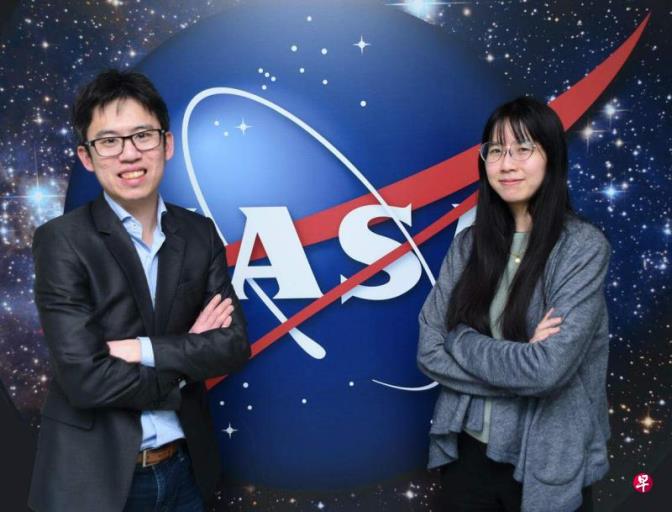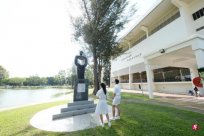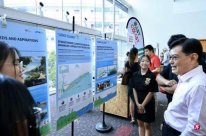
Can the moon live?Is there a border in space?These are questions many people have since childhood, and then look up at the night sky with full enthusiasm and curiosity, fantasizing how to explore the sea of stars.But when most people stay at the stage of dreaming, three Singaporeans have worked in the National Aerospace Administration of the United States and silently chased their space dreams.
When others ask Yang Lixia what work she is engaged in, her answer is: "I am studying whether the moon is suitable for us to live."

33 -year -old Yang Lixia is not joking, nor does it exaggerate.Two years ago, Yang Lixia joined the post -doctoral project of the National AERONAUTICS and Space Administration (NASA) Goddard Space Flight Center, and studied the moon soil samples collected more than 50 years ago.In order to support the Artemis Programme, NASA is re -exploring the possibility of the moon becoming a human colony, and the current research experiment that Lixia participates is trying to understand the livability of the moon environment.
"I believe that the exploration of the space field is the most exciting, bold and most difficult thing in what humans are working hard."
The Godeda Space Aerospace Center, established in 1959, is the main research center of NASA.As the first space flight center of NASA, it is where the largest scientists, engineers and technical experts in the United States are located.Scientists build spacecraft, instruments and new technologies in the space flight to study the earth, the sun, the solar system and the universe.
In 1969, when human beings landed on the moon for the first time, the Goddad Aerospace Center also played an extremely important role.The Goddard Aerospace Center is also the U.S. National Aerospace Data Center. It manages all the space flight tracking networks of ASCC, guides the launching activities of the carrier rocket, and manages the Hubble Space Telescope.
In the 50 years of NASA, its breakthrough in science and technology has a profound impact on human life. Many of the inventions and discovery have been used in human daily life. We use daily usage.The water filter system, infrared thermometer, radio tools, and even baby milk powder, food quick freezing technology, etc. all come from NASA.
Although there are 10,000 people hired by Goddard Aerospace Center, Yang Lixia went to the center to work in the first week, and "unexpectedly" encountered another Singaporean Fu Kunkai who also worked in the space center.
Due to a burns encounter "Fellow"
Yang Lixia recalled the scene with Fu Gangkai. When she was making tea, she was accidentally burned by hot water, so she walked out of the tea room and wanted to find a medicine box to apply medicine.At this time, someone was chatting outside another office of the corridor. One of the accents made Lixia feel familiar and kind.It turned out that in that office, there was a scientist who was also from Singapore.
This accent cordial Singaporean is Fu Kunkai.He joined NASA in 2018, mainly engaged in research on space meteorological, such as the interaction of space weather and sun and space environment.The important knowledge he has collected can be used to maintain the position of satellites and help satellites to resist the interference of the solar storm.
Yang Lixia said: "It is already lucky to encounter compatriots in Singapore in the United States, and it is even more rare in the field of space."
This small accident that was burned allowed the two Singaporeans to meet and become friends.The 35 -year -old Fu Kunkai went to study in the United States for 14 years. After joining NASA, he hoped to find a Singaporean who had a similar work background to build a community.From China, Japan, South Korea and other places, Southeast Asians are rare, as is Singaporeans.
Three years ago, Fu Gangkai used the English name of the American Geophysical UNION to use the English surname pinyin.Fu Gangkai said: "The Chinese surnames in other regions generally do not use the English pinyin of NG. Therefore, I guess that he is a Chinese in Singapore or Malaysia at the moment."
Sure enough, Huang Weixiang is a Singaporean. He has just completed the doctoral course and will be joined Ghodad shortly after the league meeting.At present, he is engaged in research on the middle ions of the earth's magnetic layer in NASA.

In addition to the two Singaporeans who have known, Fu Gangkai does not know whether there are other Singaporeans with a total number of NASA with a total number of more than 170,000.Gangkai said that if there are other Singaporeans, he hopes to contact them.
Entering NASA is like realizing a distant dream with elected president
Inquiring about whether he likes to work in NASA, Yang Lixia and Fu Gangkai both said in unison that they are engaged in their dream careers.
Yang Lixia loves to work in NASA. Her biggest satisfaction is that she has the opportunity to do many experiments that have never been studied by humans. This job can make new contributions to the human knowledge system.She also hopes that she will have the opportunity to participate in the space mission in the future.
Ask her if she had a space dream since she was a child, Yang Lixia said, in fact, she did not.Although she liked to read science fiction since she was a child, she was always curious about the vast universe, but she never thought that she could go to NASA to work in NASA one day.
Yang Lixia, who was studying from elementary school and high school to high school in the Raffles system, even believed that entering NASA is as far away as the president of a country or becoming an astronaut.She said: "Although I like space and astronal, I did not actively pursue it because I always think it is so out of reach."
After completing the A -level exam, Yang Lixia went to Singapore National University to study physics.She originally learned condensed physics, and later studied space physics.While she was studying for a doctorate in the United States, she cooperated with Professor Mihály Horányi of the University of Colorado to conduct Colorado Sun Wind Experiment (CSWE) to study the interaction between solar wind plasma and planetary surface and cosmic dust.
When her doctoral supervisor encourages her to apply for NASADuring the post -doctoral project, Yang Lixia originally thought that the opportunity was very slim. She did not expect that she could stand out from many applicants and successfully obtained post -doctoral projects directly funded by NASA headquarters to enter NASA's Godeda Space Center.At present, she mainly understands whether the moon is suitable for survival through various experiments and studies, so as to understand whether the moon is suitable for humans.

Similarly, although Fu Gangkai went to the University of Colorado Boulder to study astronomy and complete his doctorate after taking military service, he never thought of having the opportunity to work in NASA.
The lack of related courses in the local area resolutely decided to study abroad to study astronomy
Fu Gangkai said that he was an ordinary child from the neighborhood school. He started to like science when he was in High School.After being promoted to the National Junior College, after he participated in the school's astronomical society, he even made unlimited longing for the sea of stars.
Fu Gangkai recalled that when he applied for a university degree, there were few courses in Singapore who could take astronomy, only one of the auxiliary majors of celestial physics.He didn't know what ways could be after studying astronomy.He had been admitted to the Department of Engineering of Nanyang University of Technology, and finally decided to go abroad to chase his favorite astronomical dream.
This decision is inseparable from the encouragement of parents.At that time, few people in Singapore studied astronomy, and Fu Kunkai and his parents did not know which school to study.So his mother accompanied him to collect information everywhere to learn about college courses that could be enrolled.In the end, he entered the University of Colorado's Barde school to study physics and astronomy.
Fu Gangkai comes from an ordinary Singapore family and lives in a government -made house from an early age.Parents do three sons in small business.It is precisely because Fu Gangkai understands that it is not easy for his parents to go to the United States to complete his studies. Therefore, after he arrived in the United States, he was even more angry. He tried to finish the courses that had been completed in four years in two and a half years, saving tuition and expenses.
"I am really grateful to my parents to support my dream. They did not let me go to the engineering department that can ensure work after graduation, but encourage me to bravely chase my dreams."
It is intended to promote local college students to NASA to participate in the exchange plan
I have the opportunity to be a dream career in my mind. Fu Kunkai and Yang Lixia also hope to see more young Singapore students like them.They plan to contact several higher education institutions in Singapore to promote students to NASA for exchanges and exchange activities, so that students in Singapore have the opportunity to understand the working environment and research projects in NASA, and let them understand the way to NASA.
Fu Gangkai pointed out that today's Singapore is very different from more than a decade ago. Local students who want to develop to the space industry have more choices.Both the National University of Singapore and the Nanyang University of Science and Technology have opened a satellite research group funded by the OFFICE For Space Technology and Industry (OSTIN).Singapore signed the Artemis agreement in 2022 to cooperate with various countries to further promote the development of Singapore in the space industry.At the same time, Singapore has also appeared in many space technology startup companies in recent years.
NASA does not directly hire foreigners but can join through various research projects
"When I was studying, I never heard that some Singaporeans work in the space field, and I do n’t know what ways to develop to the aerospace industry." Therefore, when Fu Gangkai proposed to promote between NASA and the University of Singapore,When the exchange project, Yang Lixia immediately expressed support.She smiled and said, "I very much hope that more Singaporeans can participate in the field of space research and contribute to space exploration."
 ">/>">/> ">/>">/> ">/>">/> ">/>">/> ">/>">/> ">/>">/> ">/>">/> ">/>"/> ">/>">/> ">/>"/> ">">/> "/>"/> "/>"/> 987 ""> "/" "/>"/""/> "//2.jpg of?
">/>">/> ">/>">/> ">/>">/> ">/>">/> ">/>">/> ">/>">/> ">/>">/> ">/>"/> ">/>">/> ">/>"/> ">">/> "/>"/> "/>"/> 987 ""> "/" "/>"/""/> "//2.jpg of?
The National Aeronautics and Space Agency (NASA) belongs to the federal agency of the US government, and it cannot directly hire non -US nationals as civil servants.However, foreigners can directly participate in NASA projects through various subsidiary project plans and ways.
Fu Gangkai and Huang Weixiang, the Space Science and Technology Research and Exploration Center II (Center for Research and Exploration in Space Science Technology II, Cresst II) and "Partnership for HeliPhysics A ND SpaceENVIRONMENT Research "(referred to as Phaser) was hired under two research projects and worked at Goddard.
For those who are interested in entering the space career or working in NASA, Yang Lixia believes that there is no fixed road to go. The most important thing is to follow his enthusiasm for science.In addition to scientists who work in NASA, there are also writers or graphic designers engaged in scientific writing. Therefore, it is not necessary to have the opportunity to work in NASA to work in science.
Fu Gangkai also pointed out that in fact, the United States provides a lot of scholarships to apply for foreigners studying locally, such as scholarships provided by CRESST II.
In addition to doing research by himself, Fu Gangkai is also responsible for tutoring doctoral students to do research.For many years, he has brought many students from different countries, and he is looking forward to one day and have the opportunity to guide Singapore students.
Singapore National University of Science and Technology currently offers eight astronomy and astrophysics courses, including practical astronomy, astrophysics, celestial exploration and other courses to teach astronomical observation, processing and analysis of astronomical data.In addition to these courses, astronomy minor courses, meteorology and climate science courses, as well as professional courses of celestial physics.
If there is ambition to develop in the field of space science, Associate Professor Tian Yihui of the Department of Physics of the National University of Datoral Institute suggested that students consider studying physics and must master mathematics, because mathematics is the language of physics.Students who want to develop in this regard should have enough mathematics, computer programming and coding ability.




